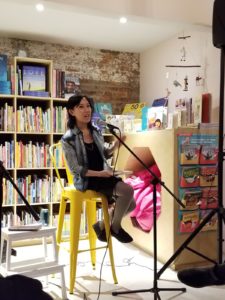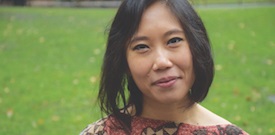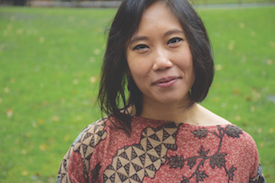YZ Chin is the author of two chapbooks, deter and In Passing. She published her full-length debut Though I Get Home in April, 2018. You can read our review of the collection here. It is available through Powell’s, your local bookstore, or your local library. She is interviewed here by APALA member Molly Higgins.
Molly Higgins (MH): Please introduce yourself and briefly describe your literary work and career path to date.
YZ Chin (YC): I’m YZ Chin, author of Though I Get Home, which is the premier winner of the Louise Meriwether First Book Prize. The prize was founded by Feminist Press and TAYO Literary Magazine to discover work by women and non-binary writers of color.
Though I Get Home is a book of interconnected stories that spiral inward to paint a picture of modern-day Malaysia. The book is tied together by Isabella Sin, a young Malaysian woman who moves from a small town to the country’s capital, participates in her first protest, and is then arrested and detained without trial for writing “inflammatory” poems.
Though I Get Home is my full-length debut. I am also the author of two poetry chapbooks, deter (dancing girl press, 2013) and In Passing (Anomalous Press, 2019).
(MH): Home is such a complicated concept– there are home countries, hometowns, apartments and houses were we temporarily reside. What are you trying to communicate with your title, “Though I Get Home”?
(YC): Absolutely agree that home is a complicated concept. The title of my book is borrowed from a brilliant Emily Dickinson poem (actually they are all brilliant, so that adjective is unnecessary). To me it is the most striking of her poems, because Emily Dickinson was famously a recluse who was always home in a literal sense. And yet she wrote this meandering poem in which the speaker is looking forward to going home, fantasizing about reaching home, but the pattern of rhyming couplets breaks down at the end of the poem, and the last line implies that the speaker will actually never get home (unless they were to live centuries).
I know there’s a religious interpretation to this poem, but really what I wanted to convey with my borrowed title was that sense of a never-ending journey toward an idea of home. We may never arrive, but the journey, the search, is meaningful.
(MH): Although the characters in your stories share circumstances and often know each other, you’ve chosen to present the different parts of their timelines as separate short stories. Can you tell us why you chose short stories, rather than a more cohesive or easy to follow novel with chapters?
(YC): When I first started writing this book, I did envision it as a novel. I wrote and revised a couple drafts of the book as a novel, but in the end had to accept that it wasn’t working. Part of it was because I had a full-time job in the tech industry, and could only write on weekends or in the evenings after work. It was hard to sustain a uniform style and voice over a longer work, when I could only write in dribbles.
Eventually I also started thinking more deeply about what kind of book I wanted to write. I decided to embrace a proliferation of styles and voices, because really that better reflects how I feel toward the ideas of home and country. I also wanted a structure that mimics the experience of growing up under state censorship, where narratives are often interrupted or sanitized, resulting in something that is choppy, disjointed.
(MH): Your stories touch on political unrest and government censorship of the news and arts. As someone born and raised in the U.S., it’s very tempting for me to consider those both un-American and undemocratic. But here we are in the midst of political turmoil and confusion about fake news and media coverage. Do you see parallels between the US and Malaysia? How do your experiences with censorship Malaysia influence your experiences now in the US?
(YC): Yes, I see some parallels. As I wrote elsewhere, the U.S. government has or will monitor social media data and search history of immigrants, of which I am one. An attorney with the Electronic Frontier Foundation commented that this could affect U.S. citizens who communicate with immigrants, and potentially lead to these citizens self-censoring out of fear. Then there are the journalists who were arrested while doing their jobs and covering the Dakota Access Pipeline protest. And so on.
For a long while, my experiences with state censorship resulted in a self-censorship within my own work that I didn’t even realize existed. But ever since I was made aware of it, I have been trying to write against that instinct to self-censor, and challenge myself to confront topics considered risky. I think that work is ongoing in the U.S., just with a different context; for example, the context in the U.S. now is my awareness of social media and search history monitoring. I have work to do to examine how that affects me as a writer.

(MH): The stories highlight the way that personal choices are influenced by global forces. And I know that’s been true for you. You’ve spent several years working as a software engineer, in part to maintain your immigration status in the US. Can you tell us about making that choice and how it has influenced your writing?
(YC): I knew that if I wanted to live in the U.S. long-term, I would have to secure a full-time job in STEM, because employers in those fields would be the likeliest to sponsor immigrant visas. At first I begrudged the time taken away from writing, but I’ve come to derive some pleasure from being part of a growing group of women and non-binary people in a male-dominated field.
Also, I think having a day job where it’s pretty black-and-white whether I’m producing the correct results helps me be more open to taking risks in my writing, where of course there’s really no “right” or “wrong” way to create good work. Knowing that I’m performing well at my day job gives me mental space to experiment in my creative writing, where so much is unknown while I figure out where the writing wants to take me. I’m more willing to try unusual things.
(MH): We’re always looking for more to read! Who are three authors we should we be reading?
(YC): Shirley Geok-lin Lim! I think her work is underrated and under-read. She is the first Malaysian writer I ever read, and I’m grateful I found her work at a relatively young age. I think of her now as an important part of Asian American literature too.
For a recent release, I’d recommend Go Home!, an anthology edited by Rowan Hisayo Buchanan. It’s a collection that showcases the wonderful diversity of Asian diasporic writers.
And of course, Louise Meriwether. Daddy Was a Number Runner is a groundbreaking book that has inspired many writers, including Jacqueline Woodson, who just won the $600,000 Astrid Lindgren prize. Woodson calls Meriwether her hero!
(MH): You’re being interviewed by a librarian, for an audience of progressive Asian American librarians. What are your thoughts on libraries and their place in supporting diverse communities?
(YC): I have a deep love for libraries. Always have. When I was growing up, every weekend I would make my dad drive me to three different libraries in town (one public, two affiliated with cultural or religious organizations). I definitely think libraries have a huge role to play in supporting diverse communities, through showcasing diverse books via staff recommendations, and through providing services like language exchange programs, or literacy and writing classes. There are so many library services that provide support to new immigrants. I hope libraries will be around forever.

(MH): What’s coming up next?
(YC): I’m working on a novel that tells the story of a heterosexual Malaysian couple living as tech worker immigrants in New York. On the cusp of work visa expirations, they are in the process of trying to secure green cards when the husband undergoes a seemingly sudden personality change. He believes he has mystical powers, and begins to tell his wife about her past life experiences (some involving Malaysian folklore or history). One day, he leaves her without warning. The book is from the woman’s perspective as she grapples with the sea changes in her life, and has to decide on the directions her future will take.
You can follow YZ on social media at:
- Twitter: @yz_chin
- Facebook: facebook.com/yzxyz/
Editing assistance provided by Silvia Lew .


